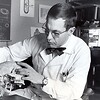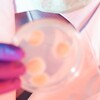-

Who pays for Rebecca Doe – and all of us?
Anna Törner on how easily we get used to the idea that healthcare is free - when it really is about how and who pays for it
-

Nobelpristagare spår första AI-läkemedlet redan nästa år
De första AI-utvecklade läkemedlen kan börja prövas redan mot slutet av året. Det säger Demis Hassabis, Googles chef för Deepmind och medgrundare till Isomorphic Labs.
-

Nocebo – the evil twin that makes you feel worse
The placebo effect is well known in healthcare, but not so its opposite: nocebo. “The effect is small, but it can have major repercussions,” says Uppsala researcher Charlotte Blease, co-author of a book on the phenomenon.
-

Venom from the deathstalker carries radiopharmaceuticals to the brain
In order to target cancerous brain tumours with radionuclides, the problematic blood-brain barrier must first be crossed. Life Science Sweden has visited a KI researcher who is trialling an unusual approach ‒ using scorpion venom.
-

“A major energy boost for the entire cancer vaccine field”
The development of cancer vaccines has accelerated in recent years. Norwegian Ultimovacs is one of the companies attempting to develop a new type of treatment line for cancer patients, and the company recently presented positive data from a phase II study.
-

Individual DNA passport could result in fewer drug side effects
You may be required to show a DNA passport when you pick up medicines at the pharmacy in the future. According to a new study, patients might suffer 30% fewer side effects if the drug treatment is adapted to their genes.
-

When carelessness, forgetfulness and coincidence become the researcher’s best friend
Forgetfulness, coincidence and a stroke of luck hardly make up a fruitful method of serious research. Or do they? Actually, a number of important medical advances have come about thanks to completely random incidents and the open-mindedness of scientists who were ready to think outside the box.
-

Ny larmrapport: Över en miljon dör på grund av resistens mot antibiotika
En bra bit över en miljon dödsfall i världen orsakades av antibiotikaresistens under 2019, enligt en analys av globala data från 204 länder.
-
Otto Cars prisas av regeringen
Får pris för sitt mångåriga och viktiga arbete mot antibiotikaresistens.
-
Mellanstor reaktor för pilotförsök
Med ett nytt flexibelt system kan man byta reaktionskärl på några minuter.
-
Plåster nytt vapen mot resistens
Göteborgsbaserade Abigo bygger ut fabrik som gör antibakteriella förband.
-
Microwave reactor for use in various synthesis applications
The Monowave 300 microwave reactor offers 850 watts of power for a variety of synthesis applications.
-
Bioreactor features disposable sensors
The Biostat Cultibag STR line of bioreactors from Sartorius-Stedim features disposable components to reduce risk of contamination.
-
Will the industry follow the economic revival?
Welcome to the eleventh Biotech Forum + Scanlab Fair!
-
Otto Cars får pris
Otto Cars prisas med APUA Leadership Award för sitt engagemang för att förebygga antibiotikaresistens.
-
Young, bright and committed to labtech
Ghazal Voghoui recently bought her first apartment and finally settled in Stockholm again. Last year, she finished her law studies and she is relieved to be back after living in Geneva for four years. On November 10 she will take a big career leap, becoming the new CEO of Swedish Labtech.
-
Nordiska pipelinen är torr
Endast 15 läkemedelskandidater anses enligt en EU-rapport ha någon ny target på multiresistenta bakterier. En restriktiv hållning att använda nya antibiotika gör att marknaden för utvecklingen är obefintlig. Ingen av läkemedelskandidaterna i rapporten är nordiska. (Uppdaterad).
-
Fat cells' reaction differs with body weight
The fat cells of overweight people may react differently to dietary changes than in their lean peers, according to a pioneering study from the Dutch organization TNO Quality of Life.
Få tillgång till allt innehåll på Life Science Sweden
Ingen bindningstid eller kortinformation krävs
Redan prenumerant? Logga in
Gäller endast personlig prenumeration.
Kontakta oss för en företagslösning.